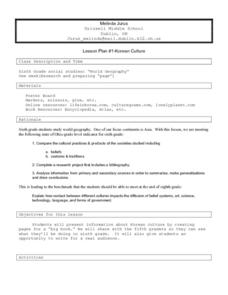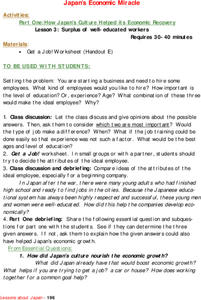Curated OER
Art and Sole
First graders discuss how culture can be transmitted from generation to generation. In groups, they create a bust of themselves after viewing various artists artwork. They also develop their own dance routine and perform it in front of...
Curated OER
How Do We Learn About the Past?
Sixth graders discuss the role of an archaeologist as a class. After viewing photographs, they relate the objects found in their local area and Ancient Egypt. They draw a picture of an object that represents their own culture and gives...
Curated OER
Culture Challenge
Students identify and classify characteristics of the four pre-European cultures in Wisconsin. They playing a game about the different characteristics that belong to each of the cultures studied.
Curated OER
People/Culture
Seventh graders explain both past and present examples of how people use of natural resources. They use the MVAC website to garther information about the prehistoric cultures in Wisconsin.
Curated OER
Kimchee
Seventh graders examine the cultural food of the country of Korea. In groups, they discover different types of foods from different cultures with a focus on Kimchee. They identify the nutritional value of the food, how it affects the...
Curated OER
Korean Culture
Sixth graders complete a research project for the sixth grade Big Book that is to be shared with the 5th graders. Students should take their time because the project represents them and the whole class.
Curated OER
Korea Lesson Plan
Sixth graders research the history and development of Korea as a culture and nation. This lesson plan is unique in that the focus is upon the neighboring countries of China and Japan in order to see their contributions to Korean society.
Curated OER
The Seven Wonders of the Republic of Korea
Students engage in research about the heritage of Korea by the using the internet as a source of information. The information is used in order to help them establish an appreciation for the culture using the cultural heritage websites.
Curated OER
South Korea
Students use primary and secondary resources in order to investigate the culture of South Korea. They use guiding questions that progressively lead them to higher order thinking to make connections from the information to how people live.
Curated OER
NCTA Lesson Plan on Korea
Students are introduced to the unique aspects of the Korean culture. Using the websites included in the lesson they research categories of subjects that are related to the culture.
Curated OER
The Japanese Tea Ceremony
Students participate in a research project that is focused upon the subject of The Japanese Tea Ceremony. They find the information and present the findings in writng. On day 3 of this lesson students have their own tea ceremonies.
Curated OER
Understanding Interpersonal Relations In Japanese CSoulture
Students investigate the culture of Japan and compare it to America. The main objective of the lesson is how culture is formed from what is called social norms. Students are introduced to some and define what they mean.
Curated OER
Japan's Economic Miracle
Students brainstorm a list of characteristics a person would need to make a good employee. In groups, they describe the attributes a person would need in various occupations and share their answers with the class. They discover how...
Curated OER
Japanese Society
Students conduct research into the life of being a person who is Japanese. The lesson uses essential questions in order to guide the research. Classroom activities are used to encourage discussion.
Curated OER
Japan
Seventh graders identify some key concepts, ideas, and facts about Japan. Students identify shared traits and differences of Japan as compared to other asian countries. Students identify how geography can affect the culture of a place....
Curated OER
What Can We Learn From the Past?
Learners observe items from their past, making inferences and observations about their own culture based on these artifacts. Students then share with the class what they learned about their own culture, giving all learners more...
Curated OER
Immigration
Fifth graders write a 2-3 page essay explaining the problems of refugees in the world today. They explain where in the world this is happening, why the refugees are leaving their homeland, where they are going, and what happens to them...
Curated OER
living in our family
Students compare a day in the life of a young person in one Asian country (India, Indonesia, Philippines, Thailand, or Vietnam) with a day in their own lives. The focus of this unit of work is on families, and students are required to...
Curated OER
Lessons from a Holocaust Survivor
Young scholars investigate the life of a prisoner in the concentration camps of WWII during the Holocaust by performing research. The lesson helps students to "put a face" on prisoners of the concentration camps.
Curated OER
WWII Newspaper Using the Team Interview Model
Learners interact with each other to conduct interviews after conducting meaningful research about the era of World War II. The interview is conducted in a group and then can be presented to another group or the whole class.
Curated OER
A Study of Genocide and Project for Rememberance
Tenth graders examine the mass execution of Ukranian Jews by the Nazis at Babi Yar through a variety of sources, including: music, poetry, primary sources and photographs. They also design a memorial for the victims.
Curated OER
Barefoot and Pregnant
Pupils address the problem of a reduction in the world population growth rate being offset by a growing world population base. This problem is particularly true with the rapid population growth in many Third World countries. The lesson...
Curated OER
Runaways Past and Present
Tenth graders use video and the Internet to compare runaway teenagers of the 1930s with runaways today. The lesson uses the integration of technology in order to build skills and conduct research.
Curated OER
Simple Justice
Students describe the effect of segregation on black and white children. They explain how these effects were proven in court.Students describe the effects that are still being felt today and what we can do to counteract them.

























